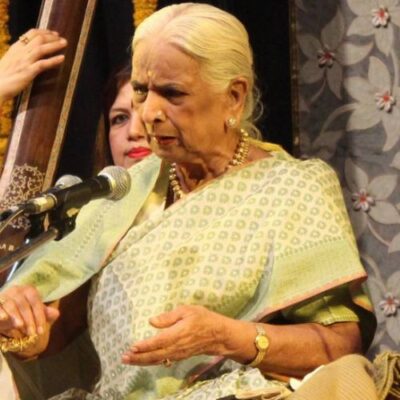
Girija Devi
Girija Devi, born on May 8, 1929, was an eminent Indian classical vocalist, widely regarded as one of the finest exponents of the Banaras Gharana (school) of music. She was born in Varanasi, Uttar Pradesh, India, and was known for her mastery of the genres of thumri, dadra, kajri, and tappa.
Girija Devi received her initial music training from her father, Ramdeo Rai, and later became a disciple of the legendary vocalist and sarangi player, Sarju Prasad Misra. She dedicated herself to the study and practice of classical music, imbibing the rich traditions and repertoire of the Banaras Gharana.
Known for her soulful and emotive renditions, Girija Devi had a commanding stage presence and a versatile vocal range. She brought to life the intricate nuances of thumri, a semi-classical genre known for its romantic and devotional expressions. Her powerful and evocative singing captivated audiences, leaving a lasting impact.
Girija Devi’s contributions to Indian classical music extended beyond her performances. She was deeply committed to preserving and propagating the art form. She served as a professor at the Banaras Hindu University, imparting her knowledge and expertise to young aspiring musicians. Additionally, she actively promoted the cause of women in music and worked to break gender barriers in a traditionally male-dominated field.
Throughout her illustrious career, Girija Devi received numerous accolades and honors, including the Padma Shri, Padma Bhushan, and Padma Vibhushan, some of the highest civilian awards in India. She was recognized for her immense contributions to Indian music and her role in preserving and promoting the Banaras Gharana.
Girija Devi’s musical legacy continues to inspire generations of musicians and music lovers. Her renditions and recordings are cherished by enthusiasts worldwide, representing the rich cultural heritage and musical traditions of India.
